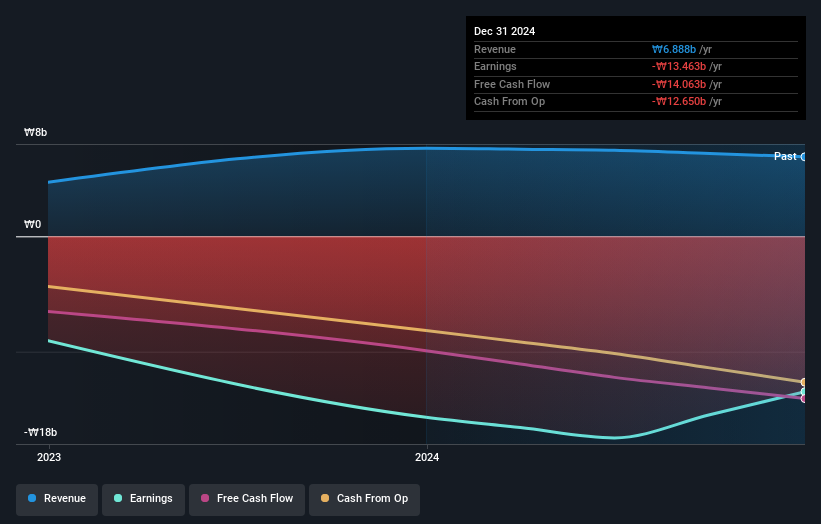- South Korea
- /
- Machinery
- /
- KOSDAQ:A475400
CMES Inc.'s (KOSDAQ:475400) stock price dropped 11% last week; retail investors would not be happy

Key Insights
- The considerable ownership by retail investors in CMES indicates that they collectively have a greater say in management and business strategy
- 48% of the business is held by the top 6 shareholders
- 38% of CMES is held by insiders
A look at the shareholders of CMES Inc. (KOSDAQ:475400) can tell us which group is most powerful. We can see that retail investors own the lion's share in the company with 52% ownership. Put another way, the group faces the maximum upside potential (or downside risk).
While insiders, who own 38% shares weren’t spared from last week’s ₩34b market cap drop, retail investors as a group suffered the maximum losses
In the chart below, we zoom in on the different ownership groups of CMES.
See our latest analysis for CMES

What Does The Institutional Ownership Tell Us About CMES?
Institutional investors commonly compare their own returns to the returns of a commonly followed index. So they generally do consider buying larger companies that are included in the relevant benchmark index.
Less than 5% of CMES is held by institutional investors. This suggests that some funds have the company in their sights, but many have not yet bought shares in it. If the business gets stronger from here, we could see a situation where more institutions are keen to buy. We sometimes see a rising share price when a few big institutions want to buy a certain stock at the same time. The history of earnings and revenue, which you can see below, could be helpful in considering if more institutional investors will want the stock. Of course, there are plenty of other factors to consider, too.

CMES is not owned by hedge funds. With a 27% stake, CEO Lee Sung-ho is the largest shareholder. Meanwhile, the second and third largest shareholders, hold 6.6% and 6.4%, of the shares outstanding, respectively.
A deeper look at our ownership data shows that the top 6 shareholders collectively hold less than half of the register, suggesting a large group of small holders where no single shareholder has a majority.
Researching institutional ownership is a good way to gauge and filter a stock's expected performance. The same can be achieved by studying analyst sentiments. Our information suggests that there isn't any analyst coverage of the stock, so it is probably little known.
Insider Ownership Of CMES
The definition of company insiders can be subjective and does vary between jurisdictions. Our data reflects individual insiders, capturing board members at the very least. The company management answer to the board and the latter should represent the interests of shareholders. Notably, sometimes top-level managers are on the board themselves.
I generally consider insider ownership to be a good thing. However, on some occasions it makes it more difficult for other shareholders to hold the board accountable for decisions.
Our information suggests that insiders maintain a significant holding in CMES Inc.. Insiders have a ₩107b stake in this ₩284b business. This may suggest that the founders still own a lot of shares. You can click here to see if they have been buying or selling.
General Public Ownership
The general public -- including retail investors -- own 52% of CMES. This size of ownership gives investors from the general public some collective power. They can and probably do influence decisions on executive compensation, dividend policies and proposed business acquisitions.
Public Company Ownership
It appears to us that public companies own 6.6% of CMES. It's hard to say for sure but this suggests they have entwined business interests. This might be a strategic stake, so it's worth watching this space for changes in ownership.
Next Steps:
It's always worth thinking about the different groups who own shares in a company. But to understand CMES better, we need to consider many other factors. For example, we've discovered 3 warning signs for CMES (1 is significant!) that you should be aware of before investing here.
Of course this may not be the best stock to buy. So take a peek at this free free list of interesting companies.
NB: Figures in this article are calculated using data from the last twelve months, which refer to the 12-month period ending on the last date of the month the financial statement is dated. This may not be consistent with full year annual report figures.
New: AI Stock Screener & Alerts
Our new AI Stock Screener scans the market every day to uncover opportunities.
• Dividend Powerhouses (3%+ Yield)
• Undervalued Small Caps with Insider Buying
• High growth Tech and AI Companies
Or build your own from over 50 metrics.
Have feedback on this article? Concerned about the content? Get in touch with us directly. Alternatively, email editorial-team (at) simplywallst.com.
This article by Simply Wall St is general in nature. We provide commentary based on historical data and analyst forecasts only using an unbiased methodology and our articles are not intended to be financial advice. It does not constitute a recommendation to buy or sell any stock, and does not take account of your objectives, or your financial situation. We aim to bring you long-term focused analysis driven by fundamental data. Note that our analysis may not factor in the latest price-sensitive company announcements or qualitative material. Simply Wall St has no position in any stocks mentioned.
About KOSDAQ:A475400
CMES
Provides intelligent robot automation solutions for mass production industries.
Excellent balance sheet low.
Market Insights
Community Narratives




